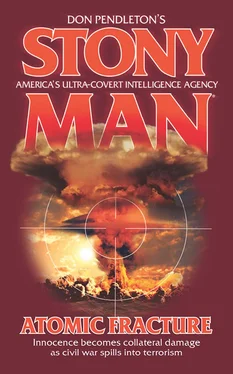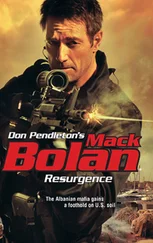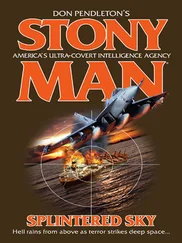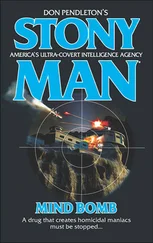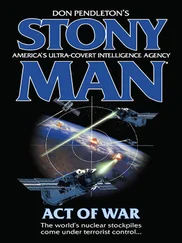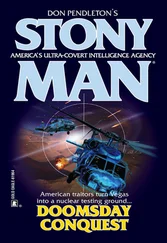Stony Man
Fighting battles few even know exist, the covert officers of Stony Man Farm are the most elite soldiers and cyber techs in the world. The team knows that if they don’t succeed, innocent victims will die.
Rebel Deception
A civil war in the Middle East is the perfect breeding ground for Al-Qaeda’s brand of terror. Taking advantage of the chaos to fuel violence between rebel fighters and government forces, Al-Qaeda’s ultimate goal is to dominate the war-torn country—no matter how many civilians they kill in the process. On the President’s orders, Phoenix Force drops in to stop the attacks before more blood is shed. Able Team remains stateside to ferret out a rebel mole who has stolen nuclear weapons from an American facility and plans to smuggle them into the Middle East. With the lines between right and wrong beginning to blur, Stony Man is sure of one thing: their only cause is the millions of lives at stake.
THROUGH THE SCOPE, DAVID McCARTER
SAW THE SNIPER’S HEAD EXPLODE
But a second later, an explosion of a different type erupted.
As if from out of nowhere, men bearing assault rifles, sawed-off shotguns and handguns shot up fifty feet farther down the line of brush and wrecked vehicles. And, unlike McCarter, they had no reason to hesitate.
“Down!” McCarter yelled. It was an unnecessary order. The men of Phoenix Force, the Special Forces soldiers and their guide had all dropped into the grass behind vehicles of their own accord.
McCarter felt his elbows sink into the damp earth behind what had once been an army jeep. He’d had no time to make an actual count. But quickly assessing the enemy, he estimated their number at roughly two dozen.
Two dozen that he could see. There could be more—many more, in fact—who had simply been slower to show themselves.
In any case, Phoenix Force and their companions were outnumbered.
Atomic Fracture


Contents
PROLOGUE
CHAPTER ONE
CHAPTER TWO
CHAPTER THREE
CHAPTER FOUR
CHAPTER FIVE
CHAPTER SIX
CHAPTER SEVEN
CHAPTER EIGHT
CHAPTER NINE
CHAPTER TEN
CHAPTER ELEVEN
CHAPTER TWELVE
CHAPTER THIRTEEN
CHAPTER FOURTEEN
CHAPTER FIFTEEN
CHAPTER SIXTEEN
CHAPTER SEVENTEEN
CHAPTER EIGHTEEN
EPILOGUE
PROLOGUE
A twisted smile fell over Emad Nosiar’s face and adrenaline shot through his body as he glanced at his watch.
Quickly he moved across the carpet of the eleventh-story hotel room to the window. Far below, at the corners of Ujaama and Sadaquee streets, he could see the cars and trucks flowing freely through the busy intersection. The sidewalks on both sides of the streets were crowded with pedestrians. Mixed in with men wearing Western-style business suits were others in traditional Muslim robes. The former were, for the most part, clean-shaved. The latter had long, untrimmed beards.
The women were of a similar mix. Some were outfitted like Western whores, wearing clothes that left their ankles and calves—not to mention their bared faces and hair—exposed for all to see and lust after. But other females had remained true to the faith in their dark burkas and veils. Behind the faithful women trailed what seemed like a dozen children each, moving along the sidewalks at a slower pace as they tried to keep together.
In the reflection off the glass, Nosiar saw his smile widen even further. The busy traffic of Ramesh, Radestan, was about to come to a screeching—and exploding—halt. And it would be of his doing.
Raising the walkie-talkie in his left hand to his lips, he pressed the binoculars to his eyes with his right. Through the lenses he could make out two ancient Ford pickups, one loaded with bales of hay, the other piled high with lawn-care equipment, parked on opposite sides of Ujaama Street. Behind the wheel of the lawn-care truck sat a man wearing a khaki shirt with military epaulets on the shoulders. In the other pickup was a long-bearded man with dark brown hair falling down his neck. Both men had removed their headgear so as not to attract attention. Though he could not see them, Nosiar knew that an eight-point Radestani army officer’s cap rested on the seat next to the man in the military shirt. A more traditional Arab headdress—known as the kaffiyeh—would be next to the driver of the other pickup.
The thought added a chuckle to Nosiar’s grinning face. One of the men would don his headwear as soon as the action started. The other would remain bareheaded as they moved their vehicles into position. Which one did which depended on who came along the streets in the next few minutes.
Nosiar turned the binoculars slightly, letting them stop on a black Buick Enclave parked in an alley a half block farther down Ujaama Street. Though he could not see it from his position on the eleventh floor of the hotel, he knew another Enclave was also in the alley almost directly beneath him.
His men were ready. He pressed the transmit button on the walkie-talkie. “Ali One to Three, Four, Five and Six,” he said in Arabic.
The acknowledgments from each driver came back in the same language. But Nosiar also needed to contact his second in command; his man on the ground who would step in and take up the slack if anything went wrong. And to contact the man he would address simply as “Two,” he needed to switch frequencies.
A simple turn of the dial on the walkie-talkie accomplished that.
“One to Two,” Nosiar said into the small portable radio. The line crackled with static. Then a somewhat hoarse voice, slightly higher in pitch than Two’s usual deep baritone, answered. “Yes, One. I am in place. All is ready. At both sites.”
Nosiar smiled to himself. The tension in Two’s voice came from the stress of the operation they were about to conduct. The man would not have been human had he not been at least a little nervous. “Good,” said Nosiar. “Remember, you will have to move swiftly between the first and second sites as soon as we have finished at the first.”
“I understand,” said the man using the simple call number Two.
Nosiar was about to speak again when he caught sight of a trio of army trucks a quarter of a mile farther down Ujaama. Quickly he switched back to the frequency that connected him to the operatives below.
The three vehicles were moving toward the intersection. And they all had canvas sides covering whatever it was they were transporting. Nosiar prayed silently that their cargo was more troops—men, government soldiers—and, therefore, his enemies. He pressed the button once more. “Three targets approaching from the south,” he said. “Strike time, approximately ninety seconds.”
“Ali Three to One,” came a voice as soon as Nosiar let up on the button. “Military or People’s Secular Opposition Forces?”
“Government vehicles,” said Nosiar. He watched through the binoculars as the man in the hay pickup quickly donned his kaffiyeh and secured it in place with a double-wound cord known as an agal. The man in the uniform slumped down in the driver’s seat, hiding the military epaulets on his shoulders and leaving his head bare.
The Radestani army trucks caught a green light at the intersection before reaching the corner where the vehicles were set up. They made good time, passing beneath Nosiar’s binoculars with twenty seconds to spare on his ninety-second estimate. But his men were ready. As soon as the third truck passed the alleys, both of the black Enclaves pulled out behind them onto the street. Then, a second or so before they reached Sadaquee Street, the pickups suddenly darted out from the curbs to block their forward progression.
Читать дальше
